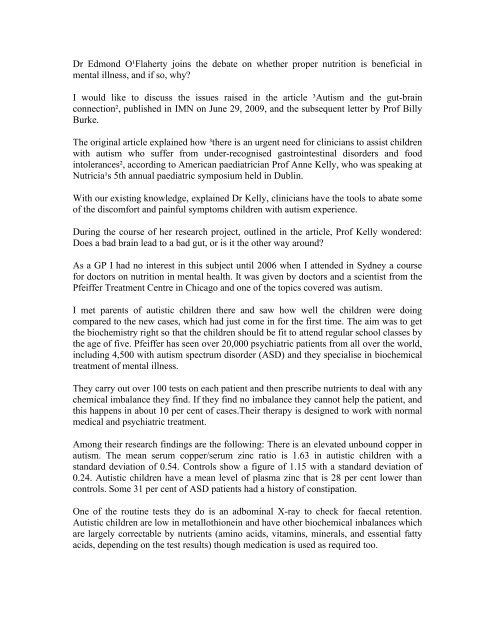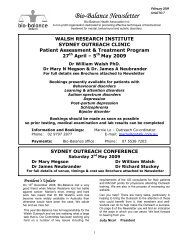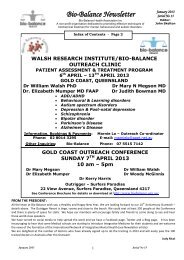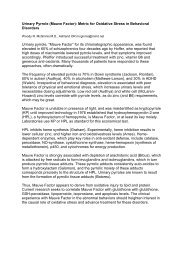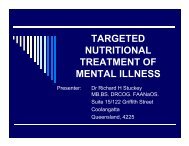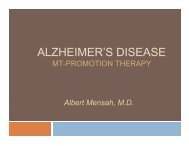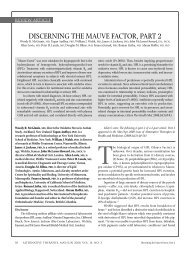Download PDF - Bio-Balance Health
Download PDF - Bio-Balance Health
Download PDF - Bio-Balance Health
You also want an ePaper? Increase the reach of your titles
YUMPU automatically turns print PDFs into web optimized ePapers that Google loves.
Dr Edmond O¹Flaherty joins the debate on whether proper nutrition is beneficial in<br />
mental illness, and if so, why?<br />
I would like to discuss the issues raised in the article ³Autism and the gut-brain<br />
connection², published in IMN on June 29, 2009, and the subsequent letter by Prof Billy<br />
Burke.<br />
The original article explained how ³there is an urgent need for clinicians to assist children<br />
with autism who suffer from under-recognised gastrointestinal disorders and food<br />
intolerances², according to American paediatrician Prof Anne Kelly, who was speaking at<br />
Nutricia¹s 5th annual paediatric symposium held in Dublin.<br />
With our existing knowledge, explained Dr Kelly, clinicians have the tools to abate some<br />
of the discomfort and painful symptoms children with autism experience.<br />
During the course of her research project, outlined in the article, Prof Kelly wondered:<br />
Does a bad brain lead to a bad gut, or is it the other way around?<br />
As a GP I had no interest in this subject until 2006 when I attended in Sydney a course<br />
for doctors on nutrition in mental health. It was given by doctors and a scientist from the<br />
Pfeiffer Treatment Centre in Chicago and one of the topics covered was autism.<br />
I met parents of autistic children there and saw how well the children were doing<br />
compared to the new cases, which had just come in for the first time. The aim was to get<br />
the biochemistry right so that the children should be fit to attend regular school classes by<br />
the age of five. Pfeiffer has seen over 20,000 psychiatric patients from all over the world,<br />
including 4,500 with autism spectrum disorder (ASD) and they specialise in biochemical<br />
treatment of mental illness.<br />
They carry out over 100 tests on each patient and then prescribe nutrients to deal with any<br />
chemical imbalance they find. If they find no imbalance they cannot help the patient, and<br />
this happens in about 10 per cent of cases.Their therapy is designed to work with normal<br />
medical and psychiatric treatment.<br />
Among their research findings are the following: There is an elevated unbound copper in<br />
autism. The mean serum copper/serum zinc ratio is 1.63 in autistic children with a<br />
standard deviation of 0.54. Controls show a figure of 1.15 with a standard deviation of<br />
0.24. Autistic children have a mean level of plasma zinc that is 28 per cent lower than<br />
controls. Some 31 per cent of ASD patients had a history of constipation.<br />
One of the routine tests they do is an adbominal X-ray to check for faecal retention.<br />
Autistic children are low in metallothionein and have other biochemical inbalances which<br />
are largely correctable by nutrients (amino acids, vitamins, minerals, and essential fatty<br />
acids, depending on the test results) though medication is used as required too.
Many patients benefit from a gluten and casein-free diet. It appears that if the gut is not<br />
functioning properly, short chains of peptides instead of separate amino acids are<br />
absorbed through the gut wall and they cannot be used in the manufacture of the 300 or<br />
so neurotransmitters that are made and broken down 24 hours per day in the brain.<br />
The whole idea of oxidative stress would seem relevant in autism, in fact, as it does in so<br />
many cases of mental health problems. For a child to make a good recovery they need to<br />
start nutrient therapy by four years of age, although some improvement can be seen in<br />
older children too.<br />
I would see a great benefit for children, parents, and the exchequer if this were done. I<br />
suggested it to the Departments of Education and <strong>Health</strong> in 2006, but, while they<br />
acknowledged my letters, they appear to have done nothing about it.<br />
Knowing about the biochemical aspects of psychiatry is enormously helpful. I will<br />
mention just one case where the gut was critical. I saw a 36 year-old woman over two<br />
years ago who had spent a total of over two years in hospital in 10 admissions in the<br />
previous 18 years, with bipolar disorder mostly. Among the tests I did was to tick the<br />
coeliac lab test on the routine blood test form. It was positive and subsequent duodenal<br />
biopsy confirmed coeliac disease, although she had minimal symptoms.<br />
This woman has followed a gluten-free diet since and her psychiatrist has gradually<br />
reduced her medication. She started to feel herself getting better within a month, has been<br />
very well for two years now and has lost four stone in weight.<br />
Four per cent of those with a history of psychosis have only coeliac disease, according to<br />
Pfeiffer. I have picked up several other cases of coeliac disease too and I now believe the<br />
coeliac antibody test should be done routinely in all psychiatric patients. I think it will be<br />
very hard in the future to defend in court a case where coeliac disease is missed in<br />
psychiatry because a doctor has not ordered this test.<br />
The place of the gut in mental illness looks to me to be significant in many psychiatric<br />
conditions including depression, schizophrenia, bipolar, ADHD, violent behaviour,<br />
Parkinson¹s disease and Alzheimer¹s disease. If the gut is working right and breaks down<br />
proteins properly the manufacture of the proper level of neurotransmitters is much more<br />
likely to be normal. Proper levels of other nutrients are critically important too, of course,<br />
but are much easier to get right.<br />
The combination of medication with proper brain nutrition is far more beneficial in my<br />
opinion than medication alone and can often make a really good improvement even in<br />
some chronic cases. I have noticed a few psychiatrists recently writing prescriptions for<br />
the amino acid tryptophan (a precursor of serotonin).<br />
Perhaps they may extend their range to cover other nutrients in due course. In the past<br />
month I have seen for the first time a psychiatrist order a test for caeruloplasmin, an
invaluable test in nutritional psychiatry and which I order routinely. If it is low, gut<br />
function is likely to be impaired in many cases.<br />
Ultimately GPs may have to deal with this topic as our patients deserve to get the full<br />
range of treatment available for mental illness and they are certainly not getting it at<br />
present. In the UK, they have started a few courses for psychiatrists on the topic recently.<br />
The one area where nutrients even when combined with medication are rarely effective is<br />
in severe OCD, although I have seen a good response in a small number of such cases.<br />
I would like to be able to mention a book that covers nutrition in mental health in detail<br />
but so far have not found one. However, the recently retired chief scientist from the<br />
Pfeiffer Centre, Dr William Walsh, PhD, has received a significant grant from a<br />
foundation to write such a book and is more than halfway through writing it. I look<br />
forward to its appearance sometime in 2010.<br />
References available on request<br />
Dr Edmond O¹Flaherty, GP, Blackrock, Co Dublin


